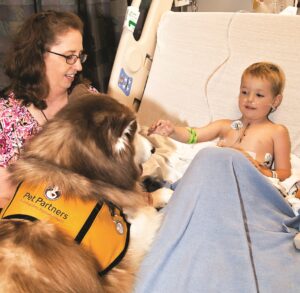



October is Adopt a Shelter Dog Month, and in honor of this important observance that helps shelter dogs find homes with loving families, we’re pleased to share this blog post about shelter pets as therapy animals.
Approximately 6.5 million animals enter shelters across the U.S each year. If you’re like many of those who have chosen to adopt, you might be wondering if you and your shelter animal would be permitted to team up with Pet Partners. The answer…?
At Pet Partners, we believe that shelter dogs (and other shelter animals) can make wonderful partners in therapy animal teams. As with any potential therapy animal, the emphasis is on the animal’s temperament and willingness to work with others, not on breed or place of adoption.
Learn more about the Pet Partners position on shelter animals as therapy animals.

Some people will rescue a pet with the intent of training that animal to become a registered therapy animal. Here are some things to look for in finding the right shelter animal for your therapy animal team:
Many animals in shelters are adolescents or adults, but this doesn’t mean that you can’t teach an old dog new tricks! Older animals have the potential to be well-socialized and have more stable temperaments. Just as Pet Partners does not discriminate by breed, it does not discriminate by upper age as long as the animal is willing and excited to be part of a therapy animal team. (Animals of most of our accepted species do need to be at least one year old to evaluate and register; rabbits, guinea pigs, and rats need to be at least six months old.)
Of course, adoption is a lifetime commitment. If you adopt an animal for the purpose of registering with them as a therapy animal and they end up not being the right fit to be a therapy animal, remember that you have committed to provide this animal a home for life.
Watch a recording of our Facebook Live session about shelter pets as therapy animals.
 Are shelter animals with disabilities allowed to be on my team?
Are shelter animals with disabilities allowed to be on my team?Absolutely! While this can depend on the type and severity of the animal’s disability, Pet Partners welcomes therapy animals with disabilities who are able to meet our program requirements. Clients often find animals with disabilities very relatable, and these animals can inspire clients to look differently at their own disabilities. Many shelter animals with disabilities are overlooked, which can lead to shelters offering them for adoption at discounted rates. For these reasons, adopting a shelter pet with disabilities to become part of your therapy team is a win-win-win!
Read about how Tommy the blind therapy cat has an impact in his community.

We require that you spend at least six months with your shelter animal (one year for birds) preparing for therapy animal visiting before registering as a therapy animal team. This allows you to build a bond and truly discover if volunteering through Pet Partners is right for both of you.
This six-month period is a great time to help your animal build basic obedience skills and to help yourself as a handler learn about how your animal functions. Try practicing these skills in a variety of environments to prepare your animal for the different situations they may encounter while volunteering.
Note that while a minimum of six months is our requirement, we encourage you to take more time if needed. Animals are individuals, and they learn and build trust on their own unique timeframe. Some animals might need a few years to be ready for the demands of therapy animal work. That additional time to prepare and build a bond with your animal will benefit both of you.
After you and your adopted animal are comfortable with each other and ready to enter the world of therapy animal visiting, you can begin the volunteering process just like any other prospective therapy animal team.

When you adopt a shelter pet, you’ll be changing more than just the life of your animal. You’ll find fulfillment as an owner and handler by experiencing the human-animal bond with your rescued furry friend. And when you register your team with Pet Partners, countless others will experience the joy that your rescue animal brings. Bringing a shelter animal to your Pet Partners team can make you wonder who rescued who.
Learn about the inspiring story of Bellin, rescue husky and therapy dog.